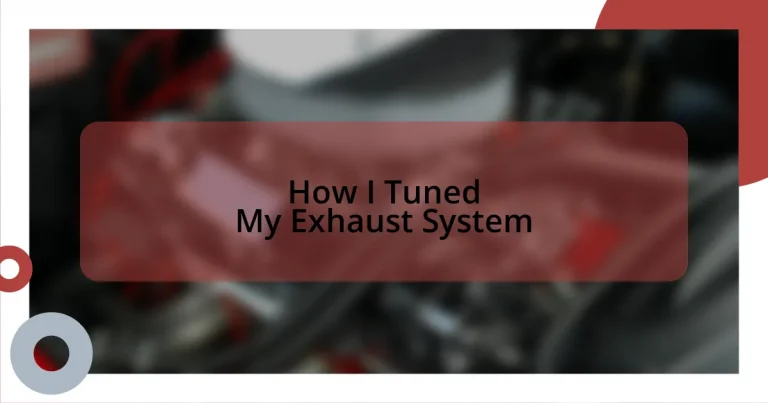Key takeaways:
- An exhaust system significantly impacts engine performance, sound, and emissions; understanding its components is crucial for effective modifications.
- Tuning improves horsepower, torque, fuel efficiency, and reduces emissions, making it both a performance enhancement and a responsible choice.
- Signs you may need exhaust tuning include unusual noises, loss of power, decreased fuel efficiency, and visible exhaust smoke.
- Regular maintenance, including inspections and cleaning, is vital for keeping the exhaust system functioning optimally.

Understanding Exhaust System Basics
An exhaust system is crucial in managing how your engine expels gases, but it goes beyond mere function. I remember the first time I really listened to my car after installing an aftermarket exhaust. The growl it produced wasn’t just noise; it was a soundtrack of power that made every drive feel exhilarating. Isn’t it fascinating how something so seemingly simple can dramatically change your driving experience?
At its core, an exhaust system comprises several parts, including the manifold, catalytic converter, and muffler. Each component plays a role in reducing emissions, enhancing performance, and controlling sound. I’ve often wondered how many car enthusiasts truly appreciate the engineering that goes into an exhaust system. When I began to understand the synergy among these components, it changed how I approached upgrades, making it more than just a hobby; it became a passion for learning.
One common misconception is that a louder exhaust always equates to better performance. Many exhaust systems enhance the car’s tone while maintaining optimal efficiency. Early on, I learned this lesson the hard way after investing in a system that looked great but sacrificed power. Have you ever experienced something similar? It’s moments like these that underline the importance of truly understanding the basics before diving headfirst into modifications.

Importance of Tuning Exhaust
Tuning your exhaust system is vital for optimizing engine performance and efficiency. In my experience, fine-tuning the exhaust can lead to noticeable gains in horsepower and torque. I once had a friend who upgraded his system, and the difference was like night and day—the car not only felt faster, but it also handled better because the engine could breathe more freely.
Imagine making a few adjustments that allow your engine to perform at its peak. It’s like unlocking a hidden gem within your vehicle. I remember feeling the excitement when I fine-tuned my exhaust; I wasn’t just aiming for a louder sound but also for a smoother power delivery. It felt like I had transformed my car into something extraordinary—it wasn’t merely transportation; it was an extension of myself.
Moreover, tuning your exhaust is crucial in managing emissions and fuel efficiency. I once had a goal of hitting a specific gas mileage figure for a long road trip, and a tuned exhaust played a big part in achieving that. By optimizing the exhaust flow, I noticed not only an improvement in performance but also a satisfying drop in fuel consumption. This connection between tuning and sustainability really struck a chord with me, making modifications feel like a responsible choice.
| Tuning Benefits | Examples/Impact |
|---|---|
| Enhanced Performance | Improved horsepower and torque for a more responsive drive |
| Better Fuel Efficiency | Increased mileage during long trips due to optimized flow |
| Reduced Emissions | Lower environmental impact with tuned exhaust systems |

Signs You Need Exhaust Tuning
Identifying the need for exhaust tuning can often feel intuitive, but there are clear signs that shouldn’t be ignored. I remember when my vehicle started to sound more like a struggling beast than the smooth performer I knew it to be. If your car exhibits any of the following symptoms, it might be time for a tune-up:
- Unusual noises, such as rattling or excessive growling
- Noticeable loss of power during acceleration
- Decreased fuel efficiency, leading to more frequent stops at the pump
- Stronger odors from the exhaust, indicating improper combustion
- Visible exhaust smoke, which can indicate deeper issues in the engine
When I first experienced a drop in power while merging onto the freeway, I felt a wave of frustration wash over me. That lack of responsiveness not only inhibited my driving confidence but made every journey feel more taxing. A well-tuned exhaust system not only restores your engine’s vitality but also revitalizes the entire driving experience, enhancing both performance and enjoyment.

Tools Needed for Exhaust Tuning
When it comes to tuning your exhaust system, having the right tools can make all the difference. From personal experience, I’ve found that a good torque wrench is essential; it ensures you’re tightening bolts to the manufacturer’s specifications. I learned the hard way during one of my early projects that under-torqued parts can lead to leaks, which can be detrimental to performance. A quality set of sockets and wrenches is equally important, as many exhaust components are tucked away in tight spaces, requiring precise handling.
Of course, I can’t overlook the value of a reliable jack and jack stands. These tools provide the safety and accessibility needed to get under your vehicle to inspect the exhaust system properly. I vividly remember the first time I crawled beneath my car, feeling a mix of excitement and trepidation. Having a sturdy setup made all the difference, allowing me to focus on the tuning process instead of worrying about safety.
Lastly, investing in a digital gauge for measuring exhaust temperatures can be a game-changer. When I first used one, I was intrigued by the data it provided, helping me pinpoint areas needing improvement. Who knew that monitoring temperatures could transform something as simple as exhaust tuning into a more scientific process? This level of insight not only helps optimize your system but also brings a sense of confidence in your adjustments, making you feel like a true gearhead.

Testing and Evaluating Performance
Testing your exhaust system’s performance can be a rewarding experience. I remember the first time I hit the road after my tuning; the sound was just exhilarating! I couldn’t help but ask myself, “Is this really my car?” As I drove, I noticed an immediate difference in throttle response. The vehicle felt more alive, eager to go—like we were in sync.
To evaluate performance effectively, I often recommend a combination of subjective feedback and objective measurements. Using a smartphone app to measure my car’s acceleration helped me gauge improvements. On one outing, I timed my 0-60 mph speeds before and after tuning. The thrill of seeing a two-second difference was like proof I could hold onto. Have you ever felt that moment when you know all your hard work has made an impact? It’s undoubtedly one of the best feelings.
Additionally, I pay attention to my fuel consumption as a litmus test for performance. If my car starts sipping gas more efficiently, I know I’ve done something right. It’s a little victory that feels personal. Picture it: you’re fueling up less often, and every mile feels more spirited. Who wouldn’t want that? Tracking these metrics helps me appreciate the enhancements and gives me a clear picture of how successful my tuning efforts have been.

Maintenance Tips for Exhaust System
Keeping your exhaust system in top shape requires regular maintenance. I’ve learned the hard way that a simple visual inspection can reveal a lot. I make it a point to check for rust or cracks at least once every few months. These issues can sneak up on you, and catching them early can save both time and money. Have you ever experienced that gut-wrenching feeling of realizing your exhaust is failing mid-drive? It’s not fun!
Another handy tip is to pay attention to the sounds your exhaust makes. I’ll never forget the day my car suddenly developed a strange rattling noise. It turned out to be a loose heat shield—an easy fix, but it made me realize how closely I needed to listen. If something sounds off, it’s worth investigating further. Trust me; a steady rhythm is what you want from your exhaust. It’s like music—anything that sounds discordant needs addressing!
Lastly, don’t underestimate the importance of routine cleaning. A good scrub can do wonders in tackling carbon buildup, which can affect performance over time. I remember one afternoon spent cleaning my exhaust tips; it felt almost therapeutic. Watching the grime wash away and seeing those shiny tips gleaming back was oddly satisfying. Plus, a clean exhaust not only looks great but also optimizes airflow. Who wouldn’t want their ride to look as good as it runs?














